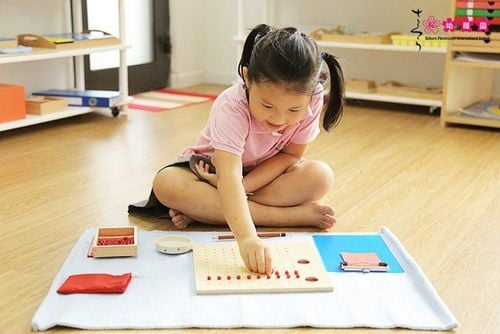This is an automatically translated article.
Mathematics is an important foundation in life. Therefore, parents need to instill a love of math from a young age. This plays a very important role. So how to nurture children's love for math?1. Help your child have a positive attitude when absorbing math
Not all children like to learn math, in fact, there are many children who hate working with numbers and become bored with this subject.
Traditional learning and teaching is not only stressful for adults, but also boring for children. Children are very easily influenced by the results when they begin to approach a new knowledge. When faced with numbers, the dry concept of math without certain progress, this makes it easy for children to feel bored, tired, and pressured, leading to stress for children. . Because of this reason, children lose interest in math, even many children become disgusted and afraid of math.
To stimulate children's interest and ability to explore and learn, our role as parents is to introduce math concepts to children naturally as part of life. This helps children enjoy math more, no longer feel bored and dry.
Mathematics is present everywhere in life, for the purpose of introducing and evoking awareness, positive reflexes and an attitude of interest in mathematics from a very young age, we need to take advantage of it. these things.
Don't let your own difficulties with math affect the way you introduce math to your child. For example, teachers now emphasize making connections between real-world activities and mathematical concepts. This helps children realize that math helps them develop good problem-solving skills. For them, learning math is really fun.
Many studies show that, in some countries, many adults claim that they hate math in school. If you are one of them, you need to remember that you should not convey that attitude to your child. When you show confidence in yourself after completing mundane tasks like counting money from your business or after a sale, balancing your books or completing income and expenses, you can help your child improve. improve their attitudes towards mathematics. You can also help your child realize the importance of math in different professions such as fashion design, restaurant management, medicine or computer programming.

Việc trẻ làm quen và học toán sớm mang đến rất nhiều lợi ích
2. Use math every day
Show your child how important math skills are in your daily life and how often you use them. Ask your child for help when you pay the bill, measure the room for a new piece of furniture, or measure the ingredients for a recipe. Show children how doctors, pharmacists, builders, and astronauts all use math in their work. Each of these activities reinforces how math skills can be useful in real life.
Parents should encourage their child to solve math problems in all situations, such as asking them to figure out the price of 2 packs of candy in the grocery store or asking them to calculate the price of a discounted toy and how much time save money to buy it while in the toy store.
Make the place where you and your child are present into a fun and exciting math learning environment, such as at home, supermarket on the way to school ....
Help your child get acquainted with numbers with excitement by giving them candy and then asking them to count the number of candies they have received.
By looking at the license plate of the car on the road, the house number, the phone number, the shape of the wheel, it helps children recognize the number and review it over and over again... Children are also very excited when given the task of going. Shopping with parents.

Hãy để con học toán bằng tất cả sự yêu thích và niềm đam mê
3. Expanding the boundaries of math
Math is not just dry numbers, it's also:
Identify geometric blocks: Ask your child how many circles are there in this picture. Attention Patterns ("This image shows a red circle, then a blue circle, then red again. What color comes next?") Comparison: between two graphs Which is bigger? Some parents are inadvertently limiting their child's ability to recognize and absorb knowledge from the surrounding world, thinking that the child is too young to start learning math or math. are just numbers, children cannot absorb.
Besides numbers, math is also about colors and shapes. You can ask the child what color is the shirt he is wearing, what is the picture on the sea? circle or square?... Introduce math knowledge for children from basic, advanced and gradually expanded depending on the age of the child. You only need to introduce primary colors (blue, red, yellow), basic shapes (circle, square, triangle). For older children, it is possible to expand their knowledge and relate to objects around them, such as what color their hairpin is? What's in the picture of your child's bag?... Help your child recognize math by giving him a chance, you will be very surprised with your little one.
By developing these skills early, your child will have an easier time grasping geometry and more complex number concepts in the future, thereby helping to foster a love of math in them, Even through these lessons you will notice that your child has a gift for math.
4. Ask math related questions
Think twice when you are calculating the amounts at the supermarket, at the furniture store and at home. You can ask more complex questions as your child gets older. Try to encourage your child to find the answer on his own before offering any suggestions. Getting the right answer isn't as important as the kids taking the steps to get there. Have fun with your kids by making funny math questions. Letting children think that math is a great way to play games for adults can make the subject more interesting.

Trong quá trình dạy cha mẹ hãy dùng nhiều câu hỏi liên quan đến toán học
5. Let your child use the computer
Kids love gadgets, adding and subtracting on the calculator is a fun way for kids to learn how to manipulate numbers. You also introduce your child to computers, which will help them when they go to school, even if they're too young to understand what's going on with the computer.
6. Try out math learning apps
While not a substitute for real-world lessons, math applications reinforce skills taught in the classroom. Also, kids love the interaction.7. Play math games
Children can learn to enjoy math by playing games like chess, sudoku....when they are young. You can teach kids math concepts like weight, volume, and density through everyday activities like playing with toys in the sandbox or in the bathtub. Or you can let your child watch TV shows that help them strengthen their math skills in a fun and practical way.
You will better understand your child's abilities, recognize positive abilities and understand the limitations that they need your support to overcome by monitoring and guiding them to do their homework. Help your child come up with a way to solve the problem by giving moderate suggestions, allowing them to make mistakes, correcting them to give them the opportunity to understand and remember the problem more deeply.
To understand the child's learning path, take an interest in the child's learning program by communicating with the teacher regularly. You will easily monitor your child's learning when you have a clear understanding of what the child needs. Mathematics gives children not only the completion of classroom assignments, but also helps children strengthen their ability to think logically, train thinking, reasoning, analysis, concentration, and application in life. During the early years of primary school, children are equipped with a foundational advantage to take math and other subjects to the next level of learning when they are given the opportunity to practice these skills.

Với những trẻ thích học toán là một tín hiệu vui cho thấy con bạn là người có tư duy và nhìn nhận tốt.
For children who like to learn math is a good sign that your child is a person with good thinking and perception. So parents, let's learn and explore from books to the outside world about math.
In contrast to children who do not like to learn math, you should not force them, this will create psychological stress and lose interest in children. Not only for learning, but even if the child is lazy to eat or does not like to do anything, parents should listen and respect their child's wishes. Because the child's soul is very sensitive to the child's words and actions, scolding only makes the child's psyche become more stressed.
When you notice that your child shows signs of language disorder, speech delay, or agitation, you need to take your child to a pediatric specialist or a psychiatric facility that specializes in Pediatric Psychiatry for a doctor. examiner and have in-depth advice.
Currently, Vinmec International General Hospital has a team of highly trained pediatricians who will examine, evaluate and guide interventions for children when they have general health problems.
Please dial HOTLINE for more information or register for an appointment HERE. Download MyVinmec app to make appointments faster and to manage your bookings easily.
Reference source: babycenter.com












